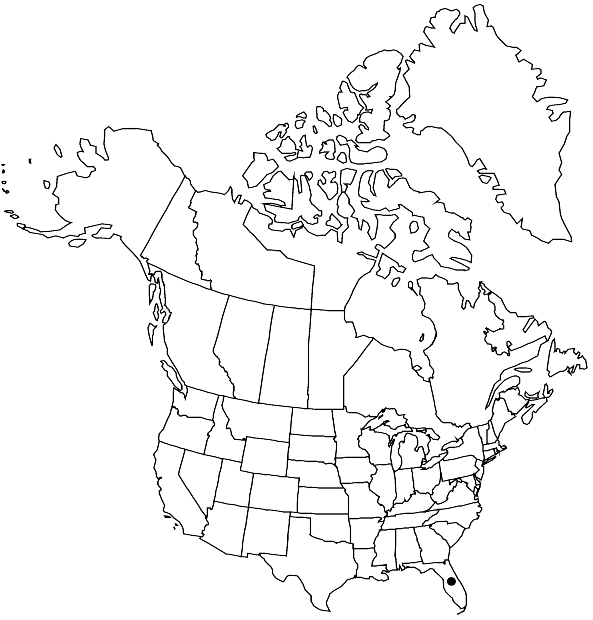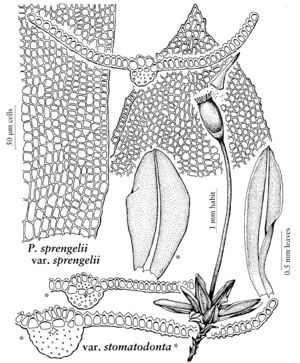Difference between revisions of "Plaubelia sprengelii var. stomatodonta"
Bull. Buffalo Soc. Nat. Sci. 32: 176. 1993,.
Basionym: Hyophila stomatodonta (Cardot) R. S. Williams
Synonyms: Desmatodon stomatodontus (Cardot) H. A. Crum Hyophila sprengelii var. stomatodonta (Cardot) R. H. Zander Neohyophila stomatodonta unknown
FNA>Volume Importer |
FNA>Volume Importer |
||
| Line 13: | Line 13: | ||
|name=Desmatodon stomatodontus | |name=Desmatodon stomatodontus | ||
|authority=(Cardot) H. A. Crum | |authority=(Cardot) H. A. Crum | ||
| − | }}{{Treatment/ID/Synonym | + | }} {{Treatment/ID/Synonym |
|name=Hyophila sprengelii var. stomatodonta | |name=Hyophila sprengelii var. stomatodonta | ||
|authority=(Cardot) R. H. Zander | |authority=(Cardot) R. H. Zander | ||
| − | }}{{Treatment/ID/Synonym | + | }} {{Treatment/ID/Synonym |
|name=Neohyophila stomatodonta | |name=Neohyophila stomatodonta | ||
|authority=unknown | |authority=unknown | ||
| Line 34: | Line 34: | ||
|elevation=low elevations | |elevation=low elevations | ||
|distribution=Fla.;Mexico;West Indies (Cuba;Jamaica);Central America (Guatemala;Honduras);South America (Brazil). | |distribution=Fla.;Mexico;West Indies (Cuba;Jamaica);Central America (Guatemala;Honduras);South America (Brazil). | ||
| − | |discussion=<p>The extensive variation of Plaubelia sprengelii var. stomatodonta was described by R. H. Zander (1983); specimens of intermediate morphology can be found both from Mexico and those that derive from the flora region. All specimens of this variety seen from Florida regularly had two stereid bands and a hydroid strand in the costa, characters displayed even in minute specimens.</p> | + | |discussion=<p>The extensive variation of <i>Plaubelia sprengelii </i>var.<i> stomatodonta</i> was described by R. H. Zander (1983); specimens of intermediate morphology can be found both from Mexico and those that derive from the flora region. All specimens of this variety seen from Florida regularly had two stereid bands and a hydroid strand in the costa, characters displayed even in minute specimens.</p> |
|tables= | |tables= | ||
|references= | |references= | ||
| Line 58: | Line 58: | ||
|publication year= | |publication year= | ||
|special status= | |special status= | ||
| − | |source xml=https://jpend@bitbucket.org/aafc-mbb/fna-data-curation.git/src/ | + | |source xml=https://jpend@bitbucket.org/aafc-mbb/fna-data-curation.git/src/8f726806613d60c220dc4493de13607dd3150896/coarse_grained_fna_xml/V27/V27_837.xml |
|subfamily=Pottiaceae subfam. Barbuloideae | |subfamily=Pottiaceae subfam. Barbuloideae | ||
|genus=Plaubelia | |genus=Plaubelia | ||
Revision as of 16:57, 18 September 2019
Leaves with apiculus sometimes lacking; costa percurrent or ending short of the leaf apex; adaxial distal laminal cells mammillose, also papillose on one or both surfaces.
Phenology: Capsules mature winter–spring.
Habitat: Thin crusts on limestone rock
Elevation: low elevations
Distribution

Fla., Mexico, West Indies (Cuba, Jamaica), Central America (Guatemala, Honduras), South America (Brazil).
Discussion
The extensive variation of Plaubelia sprengelii var. stomatodonta was described by R. H. Zander (1983); specimens of intermediate morphology can be found both from Mexico and those that derive from the flora region. All specimens of this variety seen from Florida regularly had two stereid bands and a hydroid strand in the costa, characters displayed even in minute specimens.
Selected References
None.
Lower Taxa
None.
